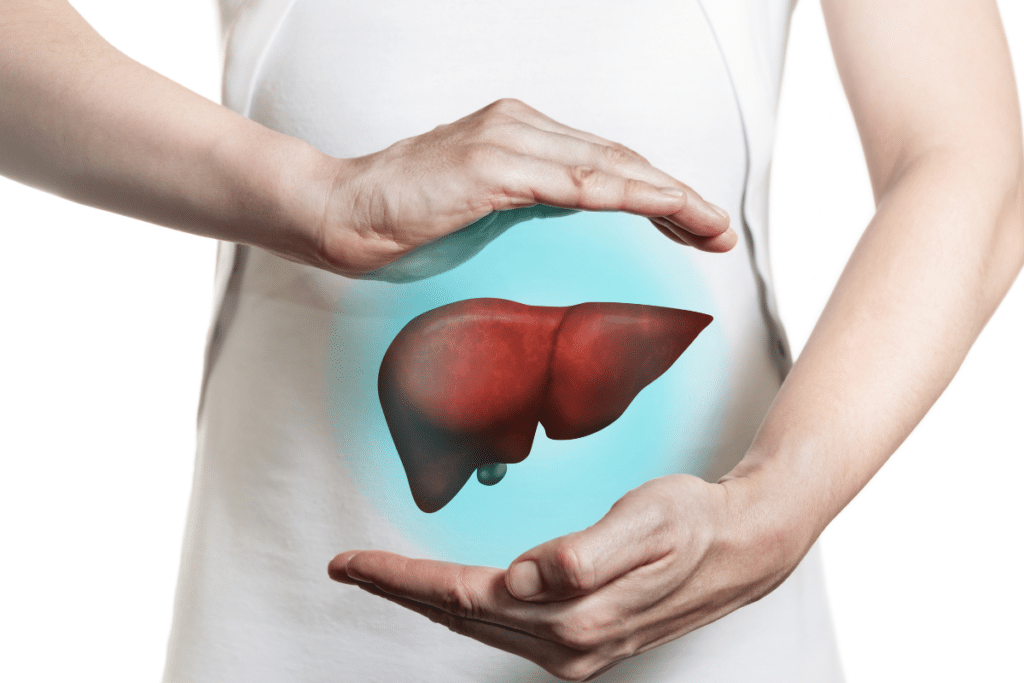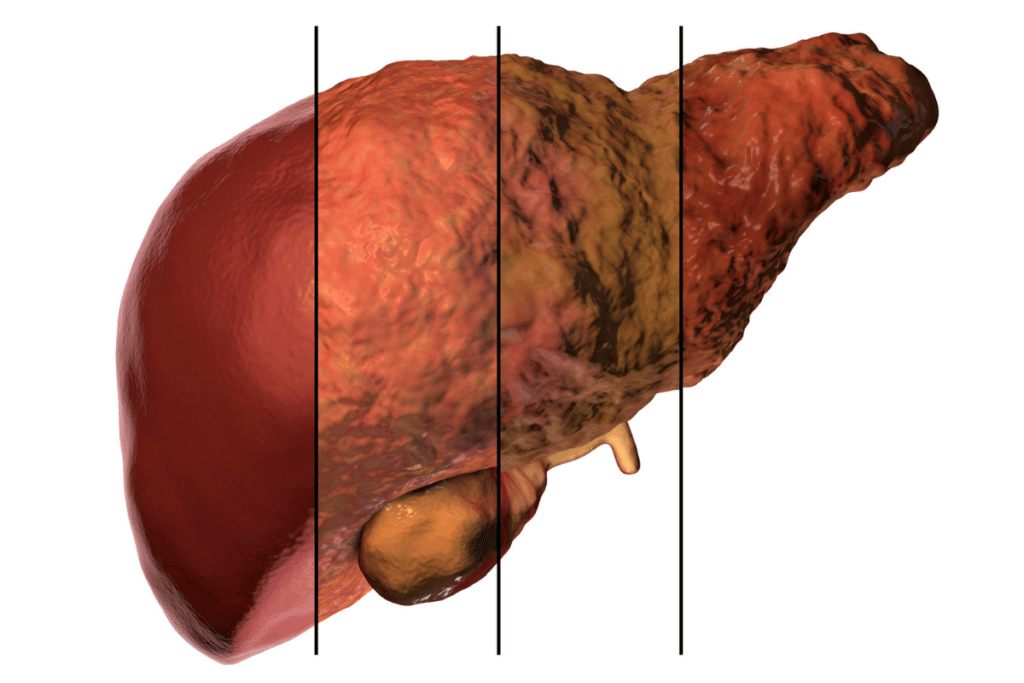The liver is an essential organ responsible for metabolic and digestive health and more. Here are 5 questions to ask your doctor about liver health...

The liver is an essential organ responsible for metabolic and digestive health and more. Here are 5 questions to ask your doctor about your liver health.
As the largest internal organ, the liver has both digestive and non-digestive functions essential to life. As part of the digestive system, it helps to promote the proper breakdown of food through the action of bile and converts the nutrients in your food into substances that the body can use. Outside of the digestive system, the liver is responsible for making proteins, converting stored energy into usable energy, filtering toxins and contaminants from the blood, and processing potentially harmful substances such as drugs or alcohol.
Liver health is essential for a myriad of functions. When your liver is not performing these functions properly, signs and symptoms can come on slowly and often sneak up on you. For this reason, it is important to promote liver health before problems arise, taking into account the many risk factors we now know and understand. Having your liver checked regularly, combined with health-promoting practices and natural supplements, is the ideal way to care for your liver.
If you have concerns about your liver, it's important to discuss them with your doctor. Most doctor's visits only last about ten minutes, so you want to make the most of your time. Knowing the key questions will help you get answers and advice on the best approach to optimising liver health.
♦ How is my liver?
♦ Are there any liver function tests we can do?
♦ What are my treatment options?
♦ How can I improve my liver health?
Getting these answers is a good start. Additional visits may be necessary, depending on your test results. If you are looking for more information about your liver health, below are the main questions to address as you continue to explore options for better liver health.
The main factors leading to poor liver function are
♦ Poor diet and excessive weight gain, leading to fat accumulation in the liver and damage to liver cells.
♦ Heavy drinking, which includes drinking more than 2 servings per day and excessive drinking.
♦ Viral infection, most often associated with lifestyle choices and risky behaviour.
♦ Excessive use of certain drugs and exposure to chemicals or toxins.
♦ Genetic conditions that cause the liver to accumulate metals, such as iron and copper, or form defective proteins, such as alpha-1-antitrypsin.

The signs of poor liver health vary depending on the underlying cause, but there are some general symptoms to bring to your doctor's attention.
♦ Abdominal pain , especially in the right hypochondrium
♦ Gas or abdominal distension
♦ General signs of poor digestion, including frequent heartburn or indigestion
♦ Fatigue , poor sleep and mental disturbance
♦ Nausea, vomiting or loss of appetite
♦ Tendency to bruise easy or prolonged bleeding time
♦ Swelling, in the legs and ankles, or swelling of the face in the morning
♦ Various itching or rashes, especially on the palms
Without early identification and treatment, liver health can deteriorate. When this happens, signs of a more serious condition may be identified, such as :
♦ Gastrointestinal bleeding
♦ Muscle loss
♦ Yellowing of the skin or eyes
♦ Spider-like blood vessels
♦ Itching and skin rashes
♦ Severe fatigue , weakness and loss of mental capacity
In order to understand the symptoms, it is important to understand the process by which your liver stops doing what it is supposed to do. As the liver becomes diseased, it becomes swollen and tender, and over time it builds up scar tissue, eventually becoming hard. Since a large amount of blood passes through the liver, the health of the liver has an impact on blood flow. Poor liver health can force blood to flow through other channels and patients may experience internal bleeding.
A healthy liver makes protein, so without adequate protein production, fluids move around in the body, causing it to swell. A healthy liver contains the bile it makes in the digestive system; otherwise, the bile leaks into the bloodstream and turns the sclera and skin yellowish. A healthy liver removes nitrogenous waste and other toxins; otherwise they accumulate in the brain and make it difficult to think and concentrate. It is important to take preventive action to maintain a healthy liver.
The longer you go without intervention, the worse your liver health can become. The range of complications can vary from moderate to severe and can include any of the following:
♦ Poor digestion
♦ Malnutrition
♦ Bleeding
♦ Swelling of the legs and abdomen
♦ Enlarged spleen
♦ Infections
♦ High blood pressure, especially in the veins that supply the liver
♦ Accumulation of nitrogenous waste and toxins
Your doctor may perform liver function tests to check the overall health of your liver, starting with a liver function test to measure the proteins and enzymes produced by the liver, and a blood count. The following blood tests measure liver health:
♦ Liver enzymes, such as ALT, AST and alkaline phosphatase
♦ Albumin
♦ Bilirubin
♦ Platelets
♦ Prolonged bleeding time
In addition to the initial chemistry and blood count, your doctor should also consider checking the following:
♦ Vitamin D
♦ Prealbumin
♦ Zinc
♦ Lipid profile
♦ Viral infections
♦ Ultrasound
A liver ultrasound should be performed, especially if any of the initial tests are abnormal. A liver ultrasound is relatively inexpensive, non-invasive and does not carry any radiation risk.

The best approach to promoting healthy liver function is through diet and lifestyle changes. Your doctor can carefully monitor and treat complications as they arise, but ultimately the best liver health is achieved through lifestyle changes.
♦ Diet: The best evidence of what constitutes a liver-healthy diet is the Mediterranean diet (MD), which is high in healthy fats (mono- and polyunsaturated), fresh vegetables, fruits and legumes, and fish. It is also lower in animal products, especially red and processed meat, dairy products and simple sugar or refined flour. There is also an emphasis on local and fresh produce, with an element of conviviality in the food tradition, meaning that eating is done as a family and community, not individually.
♦ Time-limited feeding: There is emerging evidence that restricting the amount of time spent in the fed state can help the liver to clear toxins and fat and go into fasting mode, where it has more time to metabolise energy and recover. The liver stores energy and can create energy from fat, but it will not use its resources until you give it a reason to do so. Fasting gives the liver time to put these resources to work, to renew biological tissues and to regenerate itself.
♦ Meal planning: few of us plan our meals, but it is perhaps the most important intervention we can make to improve our overall health. Preparing meals takes time and requires fresh produce, the use of cooking utensils, and then cleaning up, so it's understandable that most of us prefer to go out or eat on the run. But it turns out that this bad eating habit may be responsible for much of our health problems as a society. While there is no easy solution, start by taking your lunch to work and include fruit, vegetables, nuts and seeds for snacks.
♦ Exercise: Ideally, you want 15 to 30 minutes of physical activity per day, with the goal of breaking a sweat or at least increasing your resting heart rate. If schedules don't allow it, small changes to your daily routine can help you increase your activity level, such as taking the stairs instead of the lift, walking around the block after lunch, parking further away, and walking to work.
♦ Alcohol moderation: alcohol is processed by the liver in the same way as sugar; in addition, alcohol is a toxin that must be broken down enzymatically. Moderation is essential to maintain normal liver function; in many cases, avoidance of alcohol is the only solution to prevent further complications .
♦ Weight loss: Regardless of the method, a small reduction in your body mass index can have a significant impact on your liver. Most studies show that losing just 5-7% of your body weight can really help your liver to improve its health.
There are drugs that can treat viral infections, aid digestion and treat various symptoms, but the only treatment currently available to promote liver health is diet and lifestyle. You only have one liver and transplanting another is very high risk with a difficult chronic course.
The potential risks and side effects of medical management of poor liver health include
♦ Accelerated liver damage
♦ Electrolyte imbalance and dehydration
♦ Kidney damage
♦ Infections and bacterial overgrowth
♦ Fatigue and sleepiness
Therefore, natural supplements have a distinct advantage over current medical options for promoting liver health. The ingredients in SanaLiver™have been individually selected for their clinical effectiveness and naturally support optimal liver function. It is best used preventively, but can also help maintain residual liver function and slow the progression of chronic disease.

SanaLiver was created to be the most effective liver health supplement available on the market today. It is designed to combat the growing epidemic of poor liver health that affects over 100 million Americans.
In combination with the above dietary and lifestyle modifications, our patented ingredient formula is an effective way to provide safe and natural daily care for your liver.
♦Artichoke Extract : Artichoke contains cynarin, an antioxidant that gives this vegetable a slightly astringent and bitter taste.
"This antioxidant stimulates the gall bladder and the elimination of toxins by the liver for better digestion"
Artichoke powder also contains interesting quantities of potassium.
"This mineral has a diuretic effect, fights against water retention and helps to cleanse the body.
♦ Milk Thistle: This herb, particularly its key compound silybin , has been used for centuries to support good liver health. SanalysLab ™ has incorporated a highly bioavailable form of silybin into its formula for more effective liver support. Silybin has been shown to strengthen liver cells, protect the liver, and support the optimal breakdown of toxins.
♦ N-Acetylcysteine: NAC, an amino acid that replenishes glutathione, the body's primary antioxidant, helps support liver detoxification. Glutathione fights oxidative stress, which helps support liver health and function.
♦ L-Methionine: Methionine is an essential amino acid, and it is essential to provide sufficient quantities to maintain good health. This amino acid is unique due to its sulphur structure.
Methionine has many health benefits, it helps preserve the liver and ensures optimal protein synthesis.
♦ Reduced Glutathione: Glutathione is a rather misunderstood compound but sometimes equated as the king of antioxidants. It is a protein naturally produced by the body, which plays a key role in the functioning of the body.
In the liver, it limits the accumulation of toxins. Glutathione is therefore useful in cases of heavy metal poisoning, medication, liver disease or an altered lifestyle (smoking, alcohol, drugs or other).
♦ S-Adenosylmethionine: It plays an essential role in the glutathione cycle, a very powerful antioxidant produced by the body. A precursor of many essential amino acids, it contributes to the synthesis, activation and metabolism of hormones, neurotransmitters, proteins, etc. It is therefore essential for the proper functioning of the body, particularly the central nervous system and the liver.
The liver is an essential organ responsible for metabolic and digestive health as well as proper detoxification of the body. These important functions expose the liver to potentially harmful substances, which can damage the liver over time. In combination with healthy lifestyle choices and regular exercise, SanaLiver™offers better protection for liver cells and supports liver function.

2024 Sanalyslab all rights reserved.
Our products complement a healthy lifestyle but are not designed to diagnose, treat, cure or prevent disease. They do not replace a balanced diet or medical treatment. For medical advice, always consult a healthcare professional. The effectiveness of supplements varies from one individual to another.